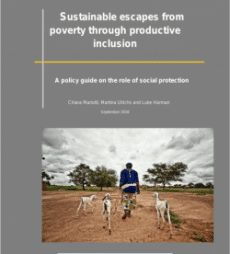
Policy highlights:
- Embedding graduation programmes into social protection systems is a promising strategy for achieving sustainable poverty alleviation. By linking cash or in-kind transfers to social protection systems, households’ productivity as well as their access to markets is increased.
- Evidence shows that such integrated social protection programmes have a positive impact on four key indicators of productive inclusion: 1) asset accumulation; 2) labour allocation; 3) income and consumption; and 4) savings and investment. However, research also shows that, with respect to productive inclusion, the poorest often benefit the least from such programmes.
- To ensure that such integrated social protection programmes do indeed achieve productive inclusion, policymakers are advised to: 1) design programmes to have several complementary interventions (such as for financial services, business and livelihood training, and the creation of market linkages); and 2) tailor programmes to the requirements of specific target groups, paying special attention to the poorest.










